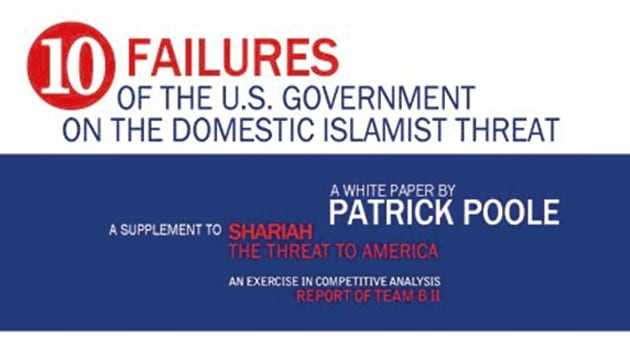10 Failures of the U.S. Government on the Domestic Islamist Threat

6
HESHAM ISLAM (2008)
Hesham Islam opens doors for extremists at the Pentagon
Following the 9/11 attacks, Army Reserve Major Stephen Coughlin was called to active duty and served in the intelligence section in the Joint Chiefs of Staff office. Tasked by his superiors to “examine the threat,” Coughlin quickly became the Pentagon’s top expert in Islamic law and warfare, and conducted numerous high-level briefings for Defense Department officials. His findings were included in a 330-page Master’s thesis accepted by the Defense Intelligence University. Retired Air Force Lt. Gen. Thomas McInerney described the analyst as “the most knowledgeable person in the U.S. government on Islamic law.”
In September 2007, Coughlin prepared a short memorandum on evidence submitted by federal prosecutors in the Holy Land Foundation terrorist finance trial that showed American Islamic organizations established by the international Muslim Brotherhood dedicated to waging a stealth “civilizational jihad”. The memo highlighted evidence that the Islamic Society of North America (ISNA) –one of the most prominent Islamic organizations in the country and an outreach partner for the Pentagon – was actively involved in this conspiracy to support terrorist groups abroad and help infiltrate American political and civic institutions from within. ISNA was named by federal prosecutors as an unindicted coconspirator and/or joint venturer in the Holy Land Foundation case.
Coughlin’s analysis ran afoul of another Pentagon official, Hesham Islam, senior advisor for international affairs for Deputy Defense Secretary Gordon England and the Pentagon’s point-man for Muslim outreach, who then began a campaign to have Coughlin fired from the Joint Chiefs of Staff. As a result of Islam’s campaign, Coughlin was informed that his contract would not be renewed when it expired on March 2008, a move that was widely criticized by many high-ranking military officials. One Army adviser called the move “an act of intellectual cowardice.”
The public attention given to Coughlin’s firing initiated media inquiries into Hesham Islam’s background. National Review reporter Claudia Rosett discovered that Islam had embellished, if not fabricated, major elements of his official biography that the Pentagon quickly removed from their website, which a spokesman said was removed “to reduce the rhetoric and the emotion surrounding this issue while we try to determine the facts.” The Investigative Project on Terrorism also discovered that Islam had not only been inviting representatives from terrortied Islamic groups into the Pentagon, but also a Lebanese ambassador who was a known proxy of the Syrian government in violation of U.S. policy. He had also arranged a meeting for Deputy Secretary England with Muslim Brotherhood official Husam al-Dairi in late 2005 that had to be canceled after protests by the State Department.
While the Pentagon “cleared” Hesham Islam for his misrepresentations on his bio, he resigned shortly thereafter.
SOURCES
Tim Kilbride, “Shared understanding provides key to defeating extremism, England says,” American Forces Press Service, April 26, 2007
Bill Gertz, “Inside the Ring: Coughlin sacked,” Washington Times, January 8, 2008
Claudia Rosett, “Questions for the Pentagon,” National Review, January 25, 2008
Jeffrey Breinholt, “Coughlin for beginners,” Counterterrorism Blog, January 28, 2008
Bill Gertz, “Inside the Ring: Islam probed,” Washington Times, February 1, 2008
Steven Emerson, “Pentagon aide’s invitations contradicted U.S. policy,” IPT News, February 4, 2008
Frank Gaffney, “The Coughlin affair,” Washington Times, February 26, 2008

